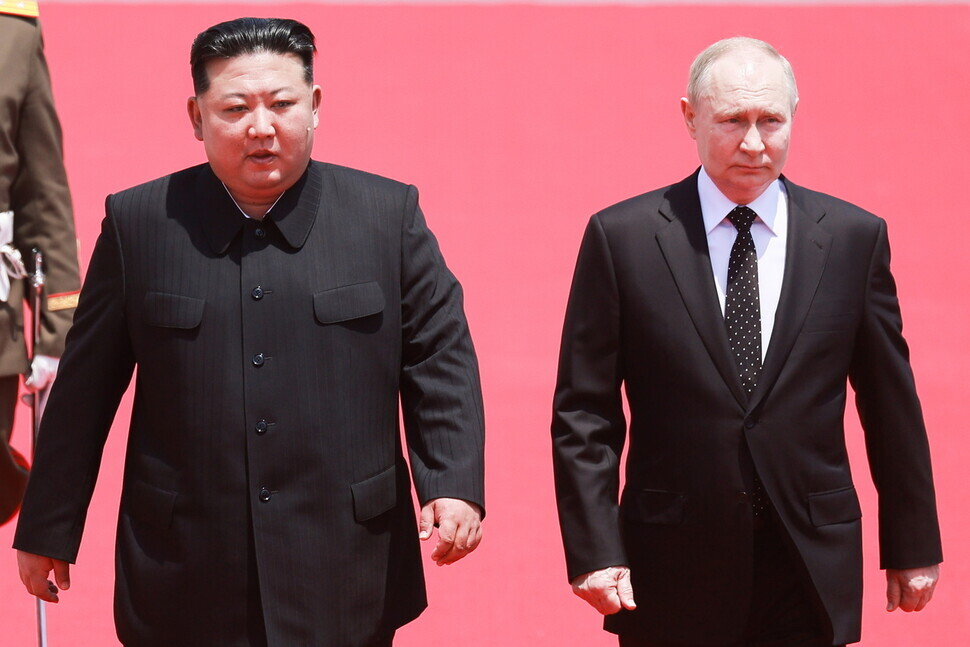hankyoreh
Links to other country sites 다른 나라 사이트 링크
[Editorial] Fortified N. Korea-Russia ties should be a wakeup call for Seoul

In a meeting in Pyongyang on Wednesday, North Korean leader Kim Jong-un and Russian President Vladimir Putin upgraded the two sides’ relationship to a “comprehensive strategic partnership” involving mutual assistance when one side is faced with an attack.
This development has profound strategic implications, signaling a dramatic revival of the Cold War framework in East Asia over three decades after it was seemingly put to result in 1990 when South Korea and Russia established diplomatic ties.
There is no denying that the Yoon Suk-yeol administration’s pursuit of skewed “values-based” diplomacy has played a large part in the tremendous crisis that South Korea now faces. Yoon needs to reexamine his foreign policy from top to bottom to avoid an outcome where North Korea and Russia’s cooperation turns into a trilateral bond with China.
The declaration by North Korea and Russia on Wednesday involved full-scale cooperation on par with the Cold War era against the US as a common foe, extending to areas including the economy, security, culture, science and technology.
Putin declared that Russia was battling against “struggle against the hegemonistic and imperialist policy towards the Russian Federation, which the United States and its satellite states have been dictating for decades,” while Kim “reaffirm[ed] our unwavering support for Russian policy as a whole.”
Based on these shared perceptions, the two sides signed a “comprehensive strategic partnership” agreement to serve as a “new fundamental document” that will “form the backbone of our relationship in the long term.”
After the summit, Putin explained that the agreement included “mutual assistance in the event of aggression against one of the parties thereto.”
In a Rodong Sinmun contribution published a day earlier on Tuesday, Putin offered a brief explanation of what would be changing in terms of North Korea-Russia relations. There, he said the two sides would “develop alternative trade and mutual settlement mechanisms not controlled by the West.”
This means that North Korea and Russia — which both face harsh economic sanctions by the West — would be increasing their trade in ways that circumvent monitoring by the US and other parties. That could allow the North to essentially neutralize the UN Security Council against it, while continuing to possess nuclear capabilities.
Additionally, the “mutual assistance” terms in the agreement mean the North could receive support from Russia in the event of an attack. While it may not reach the level of the two sides’ pledge to provide military assistance in their 1961 treaty, this would increase their security cooperation to the level of a quasi-alliance. North Korea could use these terms as a basis for providing aid to Russia in its war with Ukraine.
Some South Korean conservatives have called for sending a special envoy to Russia to resolve the current crisis, but that approach does not appear likely to yield results. China has at least shown signs of discomfort with the strategic closeness between North Korea and Russia.
Seoul needs to let go of its “values-based diplomacy” approach and step up its communication with Beijing to stop the North Korea-Russia cooperation from developing into a trilateral alliance with China. It would also be worth actively considering the replacement of the current foreign affairs and national security lineup, which has shown itself to suffer from a great many limitations.
Please direct questions or comments to [english@hani.co.kr]

Editorial・opinion
![[Editorial] Silence won’t save Yoon [Editorial] Silence won’t save Yoon](https://flexible.img.hani.co.kr/flexible/normal/500/300/imgdb/original/2024/0701/681719819632087.jpg) [Editorial] Silence won’t save Yoon
[Editorial] Silence won’t save Yoon![[Column] The miscalculations that started the Korean War mustn’t be repeated [Column] The miscalculations that started the Korean War mustn’t be repeated](https://flexible.img.hani.co.kr/flexible/normal/500/300/imgdb/original/2024/0630/9717197068967684.jpg) [Column] The miscalculations that started the Korean War mustn’t be repeated
[Column] The miscalculations that started the Korean War mustn’t be repeated- [Correspondent’s column] China-Europe relations tested once more by EV war
- [Correspondent’s column] Who really created the new ‘axis of evil’?
- [Editorial] Exploiting foreign domestic workers won’t solve Korea’s birth rate problem
- [Column] Kim and Putin’s new world order
- [Editorial] Workplace hazards can be prevented — why weren’t they this time?
- [Editorial] Seoul failed to use diplomacy with Moscow — now it’s resorting to threats
- [Column] Balloons, drones, wiretapping… Yongsan’s got it all!
- [Editorial] It’s time for us all to rethink our approach to North Korea
Most viewed articles
- 1Japan is building a military meant for more than self-defense — and has the US to thank for it
- 2[Column] The miscalculations that started the Korean War mustn’t be repeated
- 3[Editorial] Silence won’t save Yoon
- 4Yoon’s prosecutors are throwing everything at the president’s opponents to see what’ll stick
- 5Dreams of a better life brought them to Korea — then a tragic fire tore them apart
- 6Kim Jong-un says N. Korean nukes aren’t just for deterrence
- 7The greatest Korean film of all time, as selected by local industry experts
- 8South Korea creates more US jobs via direct investment than any other county
- 9NewJeans rocks Tokyo Dome as new, younger generation of K-pop fans emerges in Japan
- 10Gangnam’s sex industry